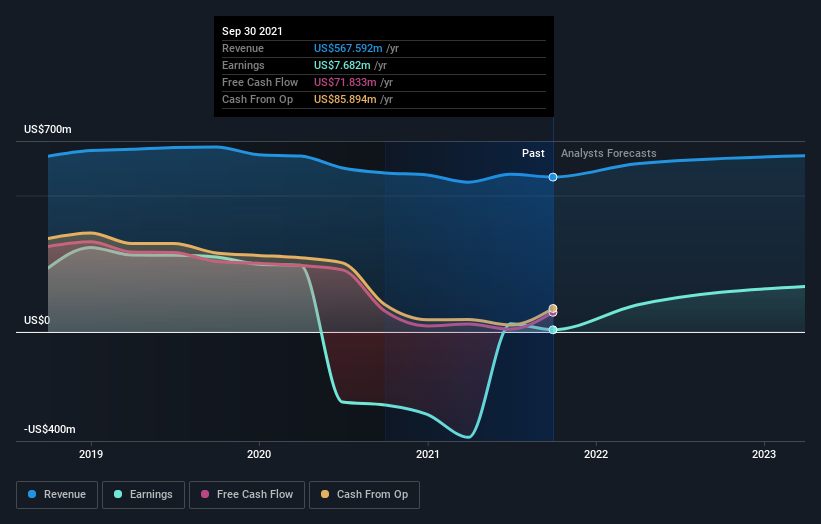- United States
- /
- Pharma
- /
- NYSE:TARO
Taro Pharmaceutical Industries (NYSE:TARO) shareholders have endured a 47% loss from investing in the stock five years ago

The main aim of stock picking is to find the market-beating stocks. But the main game is to find enough winners to more than offset the losers So we wouldn't blame long term Taro Pharmaceutical Industries Ltd. (NYSE:TARO) shareholders for doubting their decision to hold, with the stock down 54% over a half decade. And it's not just long term holders hurting, because the stock is down 39% in the last year. Furthermore, it's down 24% in about a quarter. That's not much fun for holders.
With that in mind, it's worth seeing if the company's underlying fundamentals have been the driver of long term performance, or if there are some discrepancies.
Check out our latest analysis for Taro Pharmaceutical Industries
In his essay The Superinvestors of Graham-and-Doddsville Warren Buffett described how share prices do not always rationally reflect the value of a business. One flawed but reasonable way to assess how sentiment around a company has changed is to compare the earnings per share (EPS) with the share price.
During five years of share price growth, Taro Pharmaceutical Industries moved from a loss to profitability. Most would consider that to be a good thing, so it's counter-intuitive to see the share price declining. Other metrics may better explain the share price move.
It could be that the revenue decline of 9.9% per year is viewed as evidence that Taro Pharmaceutical Industries is shrinking. This has probably encouraged some shareholders to sell down the stock.
The company's revenue and earnings (over time) are depicted in the image below (click to see the exact numbers).

We know that Taro Pharmaceutical Industries has improved its bottom line lately, but what does the future have in store? You can see what analysts are predicting for Taro Pharmaceutical Industries in this interactive graph of future profit estimates.
What about the Total Shareholder Return (TSR)?
Investors should note that there's a difference between Taro Pharmaceutical Industries' total shareholder return (TSR) and its share price change, which we've covered above. The TSR attempts to capture the value of dividends (as if they were reinvested) as well as any spin-offs or discounted capital raisings offered to shareholders. Taro Pharmaceutical Industries hasn't been paying dividends, but its TSR of -47% exceeds its share price return of -54%, implying it has either spun-off a business, or raised capital at a discount; thereby providing additional value to shareholders.
A Different Perspective
Taro Pharmaceutical Industries shareholders are down 39% for the year, but the market itself is up 15%. Even the share prices of good stocks drop sometimes, but we want to see improvements in the fundamental metrics of a business, before getting too interested. Unfortunately, last year's performance may indicate unresolved challenges, given that it was worse than the annualised loss of 8% over the last half decade. We realise that Baron Rothschild has said investors should "buy when there is blood on the streets", but we caution that investors should first be sure they are buying a high quality business. I find it very interesting to look at share price over the long term as a proxy for business performance. But to truly gain insight, we need to consider other information, too. Take risks, for example - Taro Pharmaceutical Industries has 2 warning signs we think you should be aware of.
But note: Taro Pharmaceutical Industries may not be the best stock to buy. So take a peek at this free list of interesting companies with past earnings growth (and further growth forecast).
Please note, the market returns quoted in this article reflect the market weighted average returns of stocks that currently trade on US exchanges.
Valuation is complex, but we're here to simplify it.
Discover if Taro Pharmaceutical Industries might be undervalued or overvalued with our detailed analysis, featuring fair value estimates, potential risks, dividends, insider trades, and its financial condition.
Access Free AnalysisHave feedback on this article? Concerned about the content? Get in touch with us directly. Alternatively, email editorial-team (at) simplywallst.com.
This article by Simply Wall St is general in nature. We provide commentary based on historical data and analyst forecasts only using an unbiased methodology and our articles are not intended to be financial advice. It does not constitute a recommendation to buy or sell any stock, and does not take account of your objectives, or your financial situation. We aim to bring you long-term focused analysis driven by fundamental data. Note that our analysis may not factor in the latest price-sensitive company announcements or qualitative material. Simply Wall St has no position in any stocks mentioned.
About NYSE:TARO
Taro Pharmaceutical Industries
A science-based pharmaceutical company, develops, manufactures, and markets prescription and over-the-counter pharmaceutical products in the United States, Canada, Israel, and internationally.
Flawless balance sheet with acceptable track record.
Market Insights
Community Narratives


